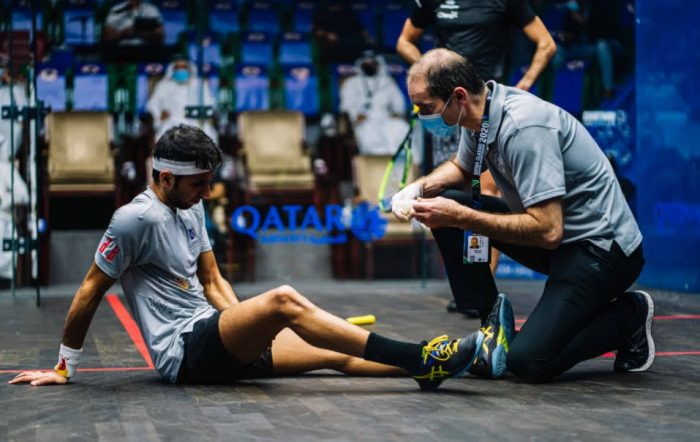Anybody that plays any kind of sport on a regular basis, will unfortunately at some point likely have to deal with the issue of injury. Particularly in a sport as physically demanding and dynamic as squash, sudden trauma injuries (such as strained muscles or sprained ligaments/tendons) or nagging overuse injuries (such as tendonitis) are common.
We talk a lot about the physical side of injury, the rehabilitation, therapy, and strengthening/rebuilding, but what is less commonly discussed is the psychological impact of injury. In this article, we’ll take a look at that side of things, and also discuss how you can switch your focus during your time out to allow you to still develop other non-physical elements of your game.
 Sport plays a very important part in the lives of many people, whether it be young athletes who play and compete at a high level with visions of possibly going on to a career in professional sport or adult men and women for whom sport perhaps fulfils an important social or stress-busting role in their lives. Either way, the frustration and emotional impact of not being able to participate in a chosen sport can be a very difficult thing to deal with and is something that is all too often not adequately addressed.
Sport plays a very important part in the lives of many people, whether it be young athletes who play and compete at a high level with visions of possibly going on to a career in professional sport or adult men and women for whom sport perhaps fulfils an important social or stress-busting role in their lives. Either way, the frustration and emotional impact of not being able to participate in a chosen sport can be a very difficult thing to deal with and is something that is all too often not adequately addressed.
Another important area to consider in dealing with the psychological element of injury relates to those who work within sports coaching and the important role that the coach themselves play in the whole process of a player dealing with and recovering from injury.
Particularly for younger children who play sport regularly, the coach has a crucial part to play in providing support and encouragement and ensuring the junior athlete does not feel left out or forgotten. Often just making the effort to still include the injured youngster in team practices and matches can go a long way, whether it be having them help you out in coaching sessions, or through some kind of record taking or marking role on days where there is a tournament or team match.
An excellent in-depth article on the topic of dealing with the psychological aspects of injury can be found at the competitivedge.com website. Esteemed American Sports Psychologist Dr Alan Goldberg’s article ‘The Mental Side of Athletic Injuries: A Coach’s and Athlete’s Guide to Psychologically Rebounding from Injury‘ is a great piece that talks about some of the consequences and impact of longer-term injury on the sportsperson, and offers guidance for both the coach and the injured individual themselves about how best to deal with the difficult emotions and frustrations that can result.
Just because you can’t train on the court or in the gym however, doesn’t mean that there aren’t ways to still work on your game while you’re injured.
A sport such as squash can be generally divided up into 4 main components – technical, tactical, physical, mental. The technical and physical aspects of the game are generally going to be the areas most affected by injury, though depending on the nature/severity of your condition there may still be ways you can do solo practices or use lower-impact physical training modalities (i.e. swimming, upper body ergometer).
The tactical and mental elements of the game however, suffer no such limitations. Trying to move on from the anger and frustration of injury is tough, but switching your mindset and reframing it as an opportunity to work hard on these two oft-neglected areas, can help you make the most productive use of your time out.
We have some fantastic content on SquashSkills from some of the finest minds in the game, and being out injured is an ideal time to diversify your focus. Alongside the technical content on the site, we have playlists on topics ranging from character development to developing mental toughness, to guides for closing out close games.
Take time to really study and digest these insights into some of the broader psychological and tactical aspects, and be sure to also check out our blog archives for some great sport psychology content. For further reading to really firm up your mental skills, a good place to start is with the books of Dr Jim Afremow, or take a look at SquashSkills favourite ‘Winning Ugly’ by Brad Gilbert.
Injury is a frustrating and distressing part of sport, but nearly every player will have to deal with it at some point or another – from the one a week amateur player to elite world professionals such as Nick Matthew and Ramy Ashour. It’s crucial to get proper medical guidance and commit to a properly constructed rehabilitation programme. Beyond this though, try and adjust your outlook to thinking about what you CAN do while injured, as opposed to what you CAN’T do.
Gary Nisbet
B.Sc.(Hons), CSCS, NSCA-CPT, Dip. FTST
SquashSkills Fitness & Performance Director
Want to learn more about dealing with a serious injury?
Check out this series where Gary Nisbet talks through stages and expectations you might face after a serious injury and uses Peter Nicol as a case study to give his own experiences.
Watch now